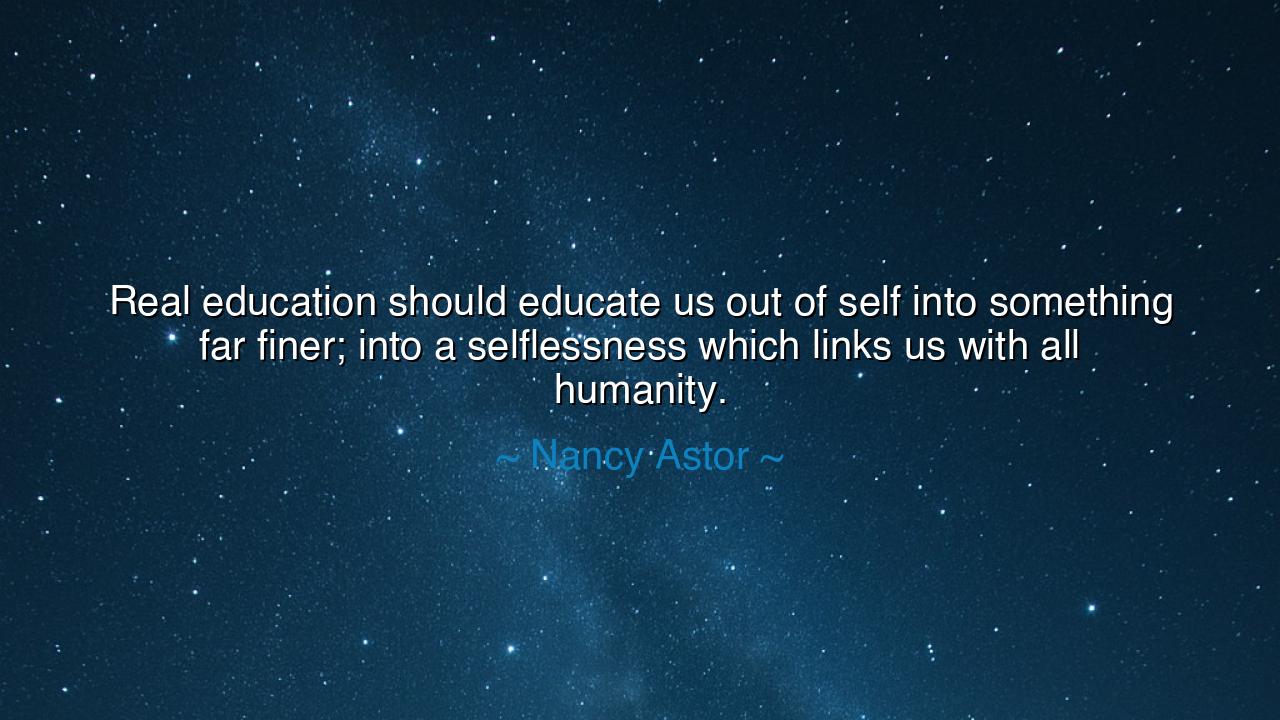
Real education should educate us out of self into something far
Real education should educate us out of self into something far finer; into a selflessness which links us with all humanity.






The words of Nancy Astor, “Real education should educate us out of self into something far finer; into a selflessness which links us with all humanity,” shine like a lantern for those wandering in the darkness of vanity and ambition. In her wisdom, Astor reminds us that the highest purpose of education is not the sharpening of intellect alone, but the refinement of the soul. It is not enough to be clever; one must become compassionate. True learning is not the accumulation of facts, but the awakening of empathy — the transformation that lifts us beyond the narrow circle of self toward the boundless fellowship of humankind.
To understand her words, we must first know who she was. Nancy Astor, the first woman to take a seat in the British Parliament, lived in an age when women’s voices were often silenced or dismissed. Yet her vision of education was not merely political; it was profoundly moral and spiritual. She saw that a society obsessed with intellect but starved of heart would never progress in justice or peace. To her, real education was not meant to breed competition or pride, but to teach connection — the kind that binds one human heart to another through understanding, compassion, and shared responsibility. Her words are not an argument for knowledge, but for wisdom.
The ancients, too, knew this truth. The philosopher Plato spoke of the soul’s ascent — that through education, one should rise from the shadows of ignorance to the light of truth. But Nancy Astor carried that vision further: she saw that such enlightenment must not end in the perfection of the individual, but in the service of the collective. The goal of learning is not to glorify the self, but to dissolve the self — to move from “I” to “we.” For what use is a brilliant mind that cannot feel the pain of another? What good is knowledge if it builds walls instead of bridges?
We can see the living embodiment of Astor’s words in the story of Mahatma Gandhi. He, too, was educated — not only in the law of men, but in the law of the heart. His learning led him away from personal comfort and toward selflessness, the higher education of the spirit. Gandhi’s wisdom did not reside in his intellect, but in his compassion; he turned knowledge into love, and love into action. Through his life, he taught the same lesson Astor expressed: that the truly educated soul does not seek to rise above humanity, but to serve within it. In serving others, one finds one’s truest self.
In this light, selflessness becomes not the denial of self, but its purification. Education, at its highest form, should strip away the illusions of superiority, greed, and indifference that cloud the heart. It should open the eyes to the suffering of others and awaken a desire to heal. A person who has studied the stars but ignores the poor has not yet learned. A person who masters words but wounds with them has not yet understood. The truly educated person, Astor reminds us, is not the one who knows the most, but the one who loves the deepest.
Her message also challenges the modern age, where education is too often measured by degrees, scores, and professions rather than by virtue, empathy, and service. In such a world, learning risks becoming a mirror of the ego rather than a window to humanity. But Astor’s wisdom calls us back to the sacred roots of education — the Latin word educare, meaning “to lead out.” To lead out of what? Out of ignorance, yes — but also out of selfishness, into something finer: the consciousness that we belong to one another. Education, in its truest form, must lead the heart outward, toward communion with all life.
Let this be the lesson: seek not knowledge that inflates the mind, but knowledge that enlarges the soul. Learn not merely to advance, but to uplift. Let your learning make you gentler, your wisdom make you humbler, your understanding make you more human. Each act of kindness, each attempt to see through another’s eyes, is the highest form of scholarship. When we live in the spirit of Astor’s teaching, we make of our lives a living school — where love is the teacher, and humanity itself is the lesson.
For in the end, real education does not create scholars; it creates servants of light. It does not crown the intellect, but sanctifies the heart. And when a person has truly been educated out of self and into the embrace of all humanity, then — and only then — have they graduated from the narrow world of knowledge into the eternal realm of wisdom.






AAdministratorAdministrator
Welcome, honored guests. Please leave a comment, we will respond soon